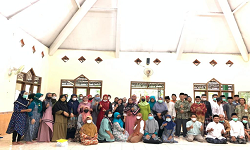Penguatan Pemahaman Jama’ah Masjid Baiturrahman tentang Bahaya Riba dan Keutamaan Perekonomian Berbasis Syariah Strengthening Understanding the Congregation of Baiturrahman Mosque Concerning the Dangers of Usury and the Superiority of Sharia-Based Economy
Main Article Content
Abstract
There are still many congregations of the Baiturrahman Mosque who do not understand well about the concept of the prohibition of usury in Islam, so that without realizing it, many of them carry out activities which in the view of Islam are classified as usury because of the lack of understanding of asset management in accordance with sharia principles. Based on the problems faced by the community at the Baiturrahman Mosque as described above, the Service Team needs to provide more understanding to the Baiturrahman mosque congregation about the dangers of usury and the importance of understanding and applying sharia-based economic concepts in everyday life. The activities that will be carried out are conducting intensive studies in the form of material exposure, studies and discussions the dangers of usury and the virtues of sharia economics. The implementation method in the activity includes the preparation stage, the implementation stage and evaluation stage. Based on the pre-test and post-test questionnaire data, participants experienced an increase in understanding of Islamic economic principles in Islamic banking by 18%. Understanding of Islamic financial institutions and conventional financial institutions has increased by 15%. Increased understanding of Interest from banks is Riba by 15.75%. understanding of the dangers of Riba increased by 18.5% and an increase in understanding of islamic financial institution products in accordance with sharia principles by 12.75%.
Downloads
Article Details

This work is licensed under a Creative Commons Attribution-ShareAlike 4.0 International License.
Authors who publish with this journal agree to the following terms:
- Any article on the copyright is retained by the author(s).
- Author grant the journal, right of first publication with the work simultaneously licensed under a Creative Commons Attribution License that allows others to share work with acknowledgment of the work authors and initial publications in this journal.
- Authors are able to enter into a separate, additional contractual arrangements for non-exclusive distribution of published articles of work (eg, post-institutional repository) or publish it in a book, with acknowledgment of its initial publication in this journal.
- Authors are permitted and encouraged to post their work online (e.g., in institutional repositories or on their websites) prior to and during the submission process, as can lead to productive exchanges, as well as earlier and greater citation of published work.
- The article and any associated published material is distributed under the Creative Commons Attribution-ShareAlike 4.0 International License
References
Al-Qardawi,Y. 2002. Fawa’id al-Bunuk hiya al-Riba al-Haram. Cairo: Dar Al-Wafa.
Antonio, M.S. 2014. Bank Syariah dari Teori ke Praktek. Jakarta: Gema Insani Press.
Barkatullah, A.H., Prasetyo, T. 2006. Hukum Islam: Menjawab Tantangan Zaman yang Terus Berkembang. Yogyakarta: Pustaka Pelajar.
Buang, A.H. 2000. Studies in The Islamic Law of Contracts: The Prohibition of Gharar. Kuala Lumpur: International Law Book Service.
Dewan Syariah Nasional Majelis Ulama Indonesia. 2004. Fatwa Majelis Ulama Indonesia Nomor 1 Tahun 2004 tentang Bunga (Interest/Fa’idah). https://mui.or.id/wp-content/uploads/files/fatwa/32.-Bunga-InterestFaidah.pdf
Efendi, A.W., Saputra, R., Syarasfati, A., Purnamasari, O. 2019. Meningkatkan Kesadaran Masyarakat Pamulang Barat dalam Menghindari Riba Melalui Sosialisasi Perbankan Syariah. Prosiding Seminar Nasional Pengabdian Masyarakat LPPM UMJ. 1–9.
Fitriyanti, F., Yunita, A., Hamsin, M.K. 2020. Peningkatan Kualitas Kompetensi Arbiter Syari’ah Di Badan Arbitrase Syari’ah Nasional (Basyarnas) Wilayah DIY, Panrita Abdi - Jurnal Pengabdian Pada Masyarakat. 4(3):290-297. https://doi.org/10.20956/pa.v4i3.7437
Hafidhuddin, D. 2003. Islam Aplikatif. Jakarta: Gema Insani Press.
Hakim, C.M. 2011. Belajar Mudah Ekonomi Syariah: Catatan Kritis terhadap Dinamika Perkembangan Perbankan Syariah di Indonesia. Tangerang Selatan: Shuhuf Media Insani.
Hermawan D. 2019. Aplikasi Perbankan Dan Persoalan Ribawi Dalam Islam Menuju Aplikasi Perbankan Bebas Ribawi. Rausyan Fikr : Jurnal Pemikiran dan Pencerahan. 15(1):1-10. http://dx.doi.org/10.31000/rf.v15i1.1375
Kazarian, E.G. 2005. Islamic versus Traditional Banking, Financial Innovation in Agypt. Boulder: Westview Press.
Kling, S.G. 2014. The Legal Encyclopediafor Home and Business. New York: Permabooks.
Maika, M.R. 2017. Buku Ajar Ekonomi Islam. Sidoarjo: Universitas Muhammadiyah Sidoarjo.
Mashuri, M. 2017. Analisis Dampak Bunga Bank (Riba) Bagi Perekonomian Negara. Iqtishaduna: Jurnal Ilmiah Ekonomi Kita. 6(1):98-107.
Saeed, A. 2006. Menyoal Bank Syariah: Kritik atas Interpretasi Bunga Bank Kaum Neo Revivalis. Jakarta: Paramadina.
Sula, M.S. 2002. Asuransi Syariah, Konsep dan Sistem Operasional. Jakarta: Gema Insani Press
Yasni, M.G. 2007. Ekonomi Sufistik, Adil dan Membahagiakan. Bandung: Mizan Pustaka
Yunita, A., Purwanto, H. 2020. Peningkatan Pemasaran Produk Kerajinan Bambu di Dusun Sanggrahan I, Desa Muntuk, Dlingo, Bantul. JPPM: Jurnal Pengabdian dan Pemberdayaan Masyarakat. 4(1):149-155. http://dx.doi.org/10.30595/jppm.v0i0.4603
